
This is a list of rivers in Chad. This list is arranged by drainage basin, with respective tributaries indented under each larger stream's name.

This is a list of rivers in Chad. This list is arranged by drainage basin, with respective tributaries indented under each larger stream's name.



Chad is one of the 47 landlocked countries in the world and is located in North Central Africa, measuring 1,284,000 square kilometers (495,755 sq mi), nearly twice the size of France and slightly more than three times the size of California. Most of its ethnically and linguistically diverse population lives in the south, with densities ranging from 54 persons per square kilometer in the Logone River basin to 0.1 persons in the northern B.E.T. (Borkou-Ennedi-Tibesti) desert region, which itself is larger than France. The capital city of N'Djaména, situated at the confluence of the Chari and Logone Rivers, is cosmopolitan in nature, with a current population in excess of 700,000 people.

Lake Chad is an endorheic freshwater lake located at the junction of four countries: Nigeria, Niger, Chad, and Cameroon in western and central Africa respectively, with a catchment area in excess of 1,000,000 km2 (390,000 sq mi). It is an important wetland ecosystem in West-Central Africa. The lakeside is rich in reeds and swamps, and the plain along the lake is fertile, making it an important irrigated agricultural area. The lake is rich in aquatic resources and is one of the important freshwater fish producing areas in Africa.
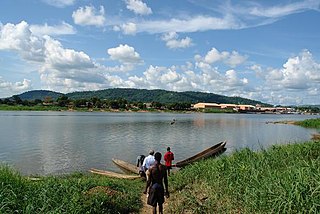
The Ubangi River, also spelled Oubangui, is a river in Central Africa, and the largest right-bank tributary of the Congo River. It begins at the confluence of the Mbomou and Uele Rivers and flows west, forming the border between Central African Republic (CAR) and the Democratic Republic of the Congo (DRC). Subsequently, the Ubangi bends to the southwest and passes through Bangui, the capital of the CAR, after which it flows south – forming the border between the DRC and the Republic of the Congo. The Ubangi finally joins the Congo River at Liranga.
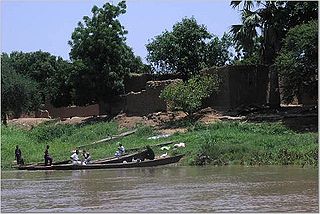
The Chari River, or Shari River, is a 1,400 kilometres (870 mi) long river, flowing in Central Africa. It is Lake Chad's main source of water.

Benue River, previously known as the Chadda River or Tchadda, is the major tributary of the Niger River. The size of its catchment basin is 319,000 km2. Almost its entire length of approximately 1,400 kilometres (870 mi) is navigable during the summer months. As a result, it is an important transportation route in the regions through which it flows. The name Benue comes from Binuwe, meaning 'Mother of Waters’ in the Batta language.
The Republic of Chad is divided into 23 regions.
Bahr Salamat is a seasonally intermittent river in Chad. It flows southwards, and is a tributary of the Chari River.

Rabih az-Zubayr ibn Fadl Allah or Rabih Fadlallah, usually known as Rabah in French, was a Sudanese warlord and slave trader who established a powerful empire east of Lake Chad, in today's Chad.
Articles related to Nigeria include:

The Bahr al-Arab or Kiir River (Dinka) is a river which flows approximately 800 km (500 mi) through the southwest of Sudan and marks part of its international border with South Sudan. It is part of the Nile river system, being a tributary of Bahr el Ghazal, which is a tributary of the White Nile.
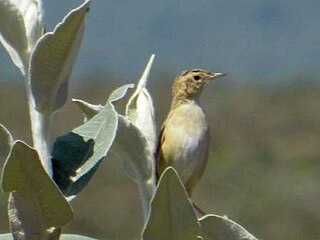
The black-backed cisticola or black-necked cisticola is a species of passerine bird in the family Cisticolidae. It is found in Burkina Faso, Chad, Republic of the Congo, Democratic Republic of the Congo, Ivory Coast, Eritrea, Ethiopia, Ghana, Guinea, Guinea-Bissau, Kenya, Mali, Nigeria, Senegal, Sierra Leone, South Sudan, Tanzania, Togo, and Uganda. Its natural habitats are subtropical or tropical dry lowland grassland and subtropical or tropical seasonally wet or flooded lowland grassland.

Federal Republic of Nigeria – sovereign country located in West Africa. Nigeria is a federal constitutional republic comprising thirty-six states and one Federal Capital Territory. Nigeria borders the Republic of Benin in the west, Chad and Cameroon in the east, and Niger in the north. Its coast lies on the Gulf of Guinea, part of the Atlantic Ocean, in the south. The capital of Nigeria is Abuja.
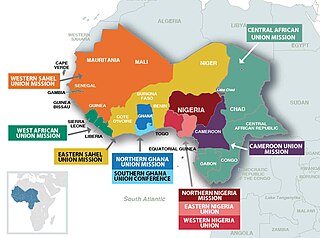
The West-Central Africa Division (WAD) of Seventh-day Adventists is a sub-entity of the General Conference of Seventh-day Adventists, which coordinates the Church's operations in 22 African countries, which include Benin, Burkina Faso, Cameroon, Cape Verde, Central African Republic, Chad, Congo, Equatorial Guinea, Gabon, Gambia, Ghana, Guinea, Guinea-Bissau, Ivory Coast, Liberia, Mali, Mauritania, Niger, Nigeria, Senegal, Sierra Leone, and Togo. Its headquarters is in Abidjan, Côte d'Ivoire. Founded in 2003, the division membership as of June 30, 2021 was 889,196.

The Bahr Aouk River is a river in central Africa. It arises in eastern Chad at the border to Sudan and flows southwest, forming a significant portion of the international boundary between Chad and the Central African Republic. The Bahr Aouk meets the Chari River, which leaves the border and flows north into the Chad.
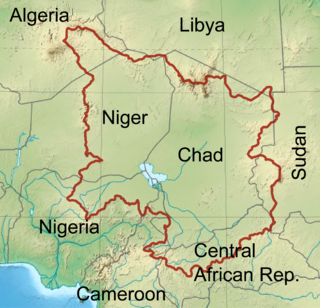
The Chad Basin is the largest endorheic basin in Africa, centered approximately on Lake Chad. It has no outlet to the sea and contains large areas of semi-arid desert and savanna. The drainage basin is approximately coterminous with the sedimentary basin of the same name, but extends further to the northeast and east.

The Dongola or Dongolawi is an African breed of riding horse. It is predominantly of Barb type, though there may have been some Arab influence in the past. It originated in the Dongola province of Sudan, for which it is named. In eastern Africa it is distributed in the northern part of Sudan and in western Eritrea; it is also present in several West African countries including Cameroon, Chad and the Central African Republic. A number of local West African breeds or types derive from it; they may be regarded as sub-types, or may be reported as separate breeds.

Between the first century BC and the fourth century AD, several expeditions and explorations to Lake Chad and western Africa were conducted by groups of military and commercial units of Romans who moved across the Sahara and into the interior of Africa and its coast. However, there was a more significant Roman and Greek presence in modern-day Eritrea and Ethiopia. The primary motivation for the expeditions was to secure sources of gold and spices from Axumite piracies.
Bahr el-Ghazal may refer to two distinct places, both named after ephemeral or dry rivers.